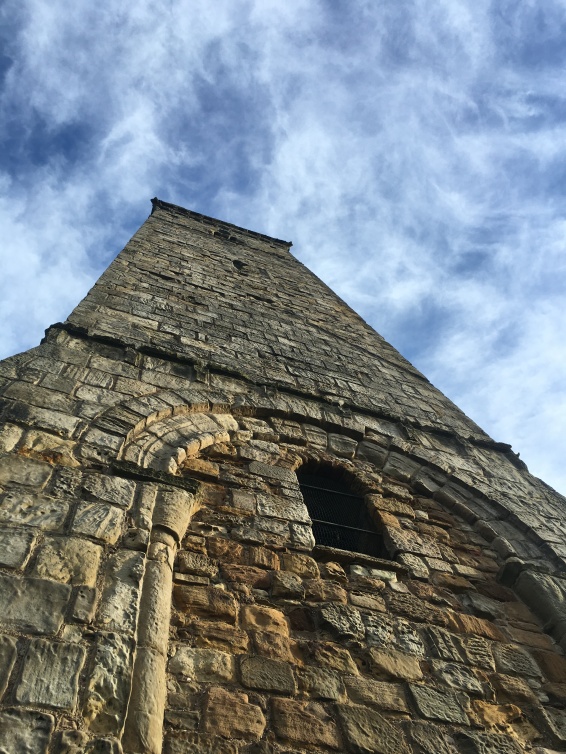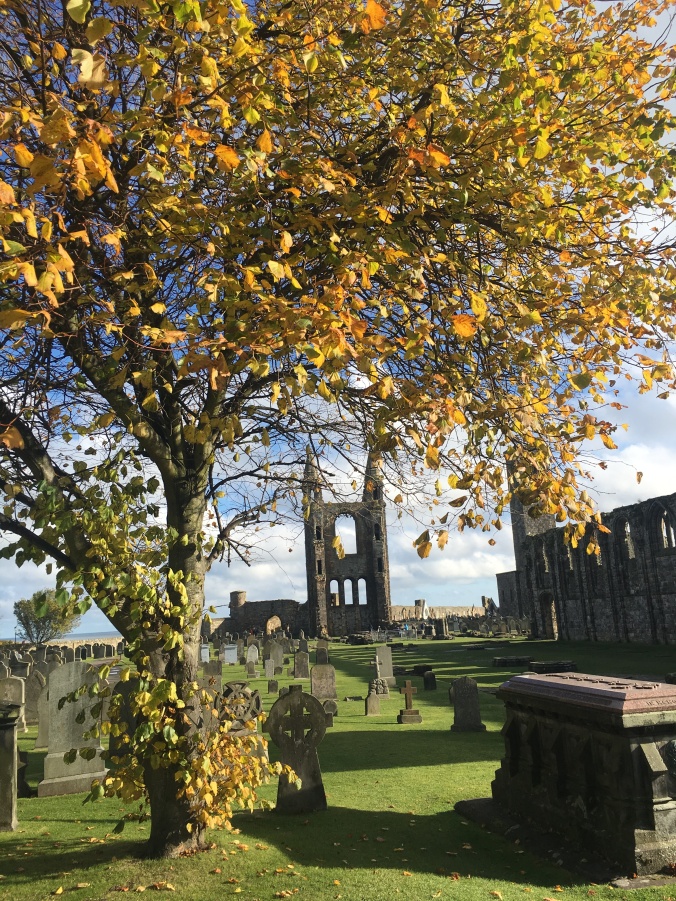
I thrust my un-mittened hands deep in the pockets of my wool coat.
An abiding chill has settled in Saint Andrews. Though I can hear water crashing on the rocks bellow, the moisture in the air has settled itself in a million minute crystals of frost on the ground. Each blade of grass is sheathed in a delicate white jacket. The veins of each fallen leaf are intricately etched, a pile of masterpieces beneath every shivering tree.
The pavement is best of all.
The cobbles and concrete look as though they are the subject of snowfall, being covered, as they are, by a translucent blanket of white. This is not, however, the garment of snow but of misty winds blown off the North sea and shattered into a great host of frozen diamonds.
Shimmering. Sparkling. Dazzling.
How could one begin to describe them?
With each slight movement of the head, one catches a wave of many coloured reflections shining from the untrodden frost. The beauty is decadent. Never was any hollywood diva garbed so extravagantly as this path behind the cathedral at night.
It’s not too late, but the sky is a deep navy, barely lit by a waning moon. Very few are out to walk this evening. None watch the tide come in but the resolute cathedral tower. I spy a couple walk by, mittened hand in mittened hand, quietly laughing, pausing to hear the waves crash and to whisper things into each other’s ears. It’s funny they whisper, for there’s no one hear them except me and I’m a far way off. But, I think whispering is an especially satisfying way to communicate; it makes everything feel special and like a secret. Perhaps I should whisper more often.
I pass by the fork in the path. Both lead down to the sea, one past the fisherman’s boats, and one past the “Auld Hoose” where many students live. I follow neither, marching straight down the middle instead, leaving footprints in the crunchy, frosted, grass carpet.
I find myself at last at the crest of the hill, next to the ruins of an old watch tower. I like it there because it overlooks East and West sands, as well as the port. And there are no lampposts here, so the stars are not obscured by light pollution.
In the darkness, I gaze up and out. A great expanse of darkness meets my eyes… and a great cloud of starry hosts.
I am thankful for these spots without artificial light. They are rare.
Living life in the technological age is like living beneath the penetrating light of one of those lamps they use when interrogating people in detective films. Screens, lightbulbs, speakers scream and shine at us, asking questions we have no answers to.
I long for silence. And darkness. And stars.
I draw a deep breath.
I suddenly feel astonishly awake. Aware of the darkness, and all that I cannot see, I am alert for foreign noises. A feeling like fear and exhilaration ceases my stomach. As my eyes adjust, I gaze upon an ocean of stars swimming to the edge of the horizon of the North sea. I am amazed that all this beauty lays hidden beneath each blue skied day, and we walk under the mystery unaware. I shiver, from a mixture of cold and excitement. It aids the numinous effect.
There is a comfort as I gaze into this lovely lonely sky: the glory and orderliness of creation has gone before me for untold days, and whatever joys, sorrows, and catastrophes come to me and this old world, the stars will go on being glorious.
For all this, nature is never spent.
There lives the dearest freshness, deep down things.
Gerard Manley Hopkins said that over a century ago, and it is as true now as it was then.
Thank goodness for poets.
I begin to amble back to my warm room, following my feathered footprints in the sparkling carpet.
I think fleetingly of how much I miss my dog.
The world and all its absurd and sad news feels far less catastrophic with an animal in your lap.
In a moment of startling serendipity, I hear a faint jingle headed in my direction. Out of the shadows of the shoreline wall, a fluffy form saunters out: a cat. I squat to pet it, and to my great surprise, it hops into my lap. I pet it for a moment, but transgress its feline ways, accidentally patting its belly. It hops off my knees, and casts a reproach glance over its shoulder, shifting weight on its elegant haunches. Gathering my coat beneath me, I sit in the frost. In this humble position, the cat glances back at me, hesitating momentarily before crawling once again into my lap. It kneads my coat with its paws, and then situates itself in compact repose, its tail wrapped neatly around its front paws.
We sit together like this for a while. I pet the cat, and it purrs with extreme satisfaction. As I run my chilled fingers over its warm fur, I am filled with something like sheer delight and comfort.
The cat departs as swiftly as it arrived. Detecting a new faint jingling, my fickle feline friend leaps from my lap, running to the cathedral wall, disappearing into a chink in the stone.
The new jingler comes bounding around the corner, this time accompanied by a human.
It is a poodle, and it wastes no time in bounding up to me, pressing its warm, wet nose between my knees. I bend to pet its tight curls. It preens, and deigns to endure my affection.
“Her name is Sunshine. Isn’t she a lovely animal?” Says the accompanying human, a woman of at least seven decades, effervescent curls hidden beneath a wool scarf.
“She’s beautiful!” I reply.
“She’s not mine, but I watch her.” replies the lady.
We exchange a few more words, and then at last I find myself homeward bound again.
I laugh to myself. How funny to meet a dog called “sunshine” in the navy dark of this wintery evening.
I am back from my walk now, my knees tucked against my chest, with the cosiest of blankets around my shoulders. I find that the world makes more sense to me than it did before. And I make more sense in it.
To say my hour long encounter with the natural world was “therapeutic” seems incorrect. Encountering the wildness of a Scottish winter night isn’t good because it makes me feel better, but because there is something about coming into contact with nature that is good, right, ordered. It’s not about my feelings, but about the essential richness of my relation to the world in that state. Something in encountering the wild, untamed and creaturely that draws me back into a deeper reality than the anxious world of screens can offer me.
I have remembered, for a time, who I, and we all, are meant to be: gardeners. We are meant to be at home resting in the grace of given things, cultivating the willing earth, marvelling at the celestial hosts as they dance over us each day. Tasting, touching, smelling the love of the Great Gardener.
In this weary world, it seems we will never experience the fullness of this calling. But in the midst of our struggling world, let us not take for granted these creature comforts, the beauty of a midnight walk, the satisfied purr of a rested kitten, the smile of a stranger. It is my naive and persistent belief that such comforts drawn us back to the givenness of our being, and cause us to live humbler, holier lives.
They remind us that we are small and creaturely.
Perhaps that is the best place to start.
I come into the presence of still water.
And I feel above me the day-blind stars
waiting with their light. For a time
I rest in the grace of the world, and am free.
– Wendell Berry, “Peace of Wild Things.”




